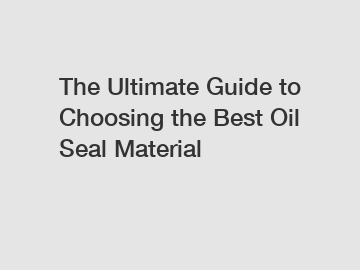## The Ultimate Guide to Choosing the Best Oil Seal Material.
### 1. What factors should be considered when choosing oil seal material?
When choosing the best oil seal material, there are several factors that need to be considered:

1. **Chemical Compatibility**: The material should be able to withstand the chemical properties of the fluids it will be in contact with.
.
2. **Temperature Resistance**: The material should be able to withstand the temperature range of the application without degrading.
3. **Pressure Resistance**: The material should be able to withstand the pressure of the application without failing.
4. **Abrasion Resistance**: The material should be able to resist wear and tear from the moving parts it will come into contact with.
### 2. What are the common materials used for oil seals?
There are several common materials used for oil seals:
1. **Nitrile (NBR)**: Nitrile is a versatile material that offers good resistance to oils, fuels, and hydraulic fluids. It is cost-effective and widely used in various applications.
2. **Viton**: Viton is a high-performance material that offers excellent chemical resistance, high temperature resistance, and excellent mechanical properties. It is commonly used in high-performance applications.
3. **Polyacrylate (ACM)**: Polyacrylate offers good resistance to oils and high temperatures. It is commonly used in automotive applications.
4. **Polytetrafluoroethylene (PTFE)**: PTFE offers excellent chemical resistance and low friction properties. It is commonly used in applications where there are high speeds and temperatures.
### 3. How to choose the best oil seal material for your application?
To choose the best oil seal material for your application, you should:
1. **Consider the Operating Conditions**: Evaluate the temperature, pressure, and chemical environment the oil seal will be exposed to.
2. **Select a Material with the Right Properties**: Choose a material that offers the right balance of chemical resistance, temperature resistance, and mechanical properties for your application.
3. **Consult with a Material Expert**: If you are unsure about the best material for your application, consult with a material expert who can help you select the right material based on your specific requirements.
By considering these factors and selecting the appropriate material, you can choose the best oil seal material for your application to ensure optimum performance and reliability.
If you want to learn more, please visit our website colored o rings distributor, rubber shock absorber damper, customized pu parts.



Comments
All Comments (0)